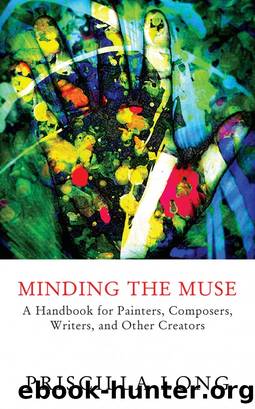Minding the Muse by Priscilla Long

Author:Priscilla Long
Language: eng
Format: epub
Tags: book
Publisher: Coffeetown Press
Published: 2016-08-23T00:00:00+00:00
IX.
Completing Works
There is a magical power in every completed, self-contained creation.79
âPeter Zumthor
What if itâs totally embarrassing?
I only do it for myself.
What if it will expose my true nature as silly and stupid?
If my mother saw this she would never speak to me again.
How do I know if itâs finished?
This subject matter bores me now.
Iâm not looking for fame. I donât care.
What if it shows me up for the fraud I am?
This is stupid and dumb.
Whatâs the point? Thereâs no money in art.
These are all rationalesâat times subconsciousâfor not completing a novel, for leaving piles of paintings half-finished, for never finishing that collage or that poem. They may also occur to artists whoâve become successful in one style or mode and thereafter feel a certain reluctance to venture out into new creative territory. Being ignored or scorned following success is no fun. Yet the greatest artists are constantly venturing into new territory, risking failure and even ridicule.
How do you know when a piece in finished? For one thing, thereâs no simple rule, obviously. Itâs a judgment. If you seldom or never make the judgment, something is wrong. I think of completing a piece as a craft skill. Can you tell a brilliant opening from an average one? Can you tell a virtuoso sentence from an average one? Can you tell a resolved painting from a half-finished or abandoned one? Of course oneâs savvy increases as the years of creative endeavor roll on. But never declaring a piece finished is exactly the same as never finishing a piece. If you âfinishâ it, you might fail. If itâs not done yet, it hasnât failed yet either.
The process of finishing a work typically overlaps with its first reading or viewing, its first public exposure to your peers or to your first (probably small) audience. At this point you may receive some useful feedback. Even with no feedback, the act of presenting in itself helps you to see work from the outside, to get distance from it. This in turn helps you see where to make necessary tweaks. Completing works and putting them out in the world is part of the creative process. The moment you become aware of its potential or actual audience is the moment you see touches and fixes it requires that you hadnât seen before. And once youâve released it to the world, youâve cleared room for new works. Time to celebrate. Time to cogitate the next piece.
And yes, thereâs such a thing as finishing a piece twice or three times. Time passes and you see something more you can do. Poets have been known to revise a poem after publication. Is there such a thing as a novel that was finished the first time it was finished? Finishing is a process, sometimes a rather extended one.
Hereâs what finishing is not. Itâs not awaiting pats of approval from your workshop, teacher, mentor, agent, editor, or other power. The creator who waits for approval has suspended judgment and claims to have no way to judge.
Download
This site does not store any files on its server. We only index and link to content provided by other sites. Please contact the content providers to delete copyright contents if any and email us, we'll remove relevant links or contents immediately.
Things Are What You Make of Them: Life Advice for Creatives by Adam J. Kurtz(1862)
The Monuments Men by Robert M. Edsel(1776)
The Freelance Manifesto: A Field Guide for the Modern Motion Designer by Joey Korenman(1642)
Find Your Artistic Voice by Lisa Congdon(1423)
The Business of Being an Artist by Daniel Grant(1376)
101 Gag Ideas: Companion to the One Minute Caricature by James van der Keyl(1356)
Boom by Michael Shnayerson(1330)
Your Art Will Save Your Life by Beth Pickens(1286)
Your Inner Critic Is a Big Jerk by Danielle Krysa(1277)
Breakfast at Sotheby's(1233)
The Lady in Gold by Anne-marie O'connor(1223)
Seven Days in the Art World by Sarah Thornton(1222)
Create Your Art Career by Rhonda Schaller(1211)
How to Survive and Prosper as an Artist by Caroll Michels(1196)
Need you Now (Top Shelf Romance Book 2) by unknow(1164)
When Talent Isn't Enough: Business Basics for the Creatively Inclined by Kristen Fischer(1152)
33 Artists in 3 Acts by Sarah Thornton(1141)
Art of the Deal by Noah Horowitz(1108)
Art Held Hostage by John Anderson(1100)
